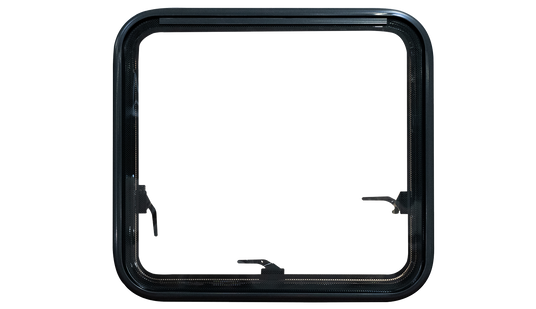
Double-glazed motorhome windows comprise of two acrylic plastic panels bonded together, usually with a shaped outer and flat inner pane. Acrylic plastic is susceptible to edge impact and can easily crack. Cracks cannot be repaired. In the rare event that the two acrylic panes start to delaminate it is important to take action to avoid the panes detaching while driving and potentially causing an accident. Double-glazed windows that experience delamination, i.e the acylic panels coming apart often signified by excess condensation or water in the double-glazed unit, should be either replaced or have a safety repair. A safety repair involves drilling and plugging the four corners, however, it will not stop the delamination and therefore it is unlikely to reduce moisture entering the unit.
Motorhome Window Options
-
Window styles:
Windows can be with or without an external frame although the construction of the double-glazed acrylic window fitted to both are identical. Opening windows normally are hinged from the top.
-
Colour/Tint:
Available in clear and various tints. Grey tint is the most popular. Bronze tint is fitted to many models built up to 2005 but has been withdrawn as it was found not to be UV stable and this resulted in the bronze tint faded with prolonged exposure to sunlight. Most windows also have a printed band around the edge. The colour of the hinge rail fitted to the window can vary depending on when the motorhome was built, however, the hinge rail is not removable and therefore cannot be refitted to a different window to match the other windows fitted to the motorhome All of these factors need to be taken into account if an owner is considering buying a second hand window, together with the the internal positions of handles and stays.
-
Strength:
Acrylic is relatively strong but is susceptible to cracking if it sustains a hard impact to the edge. Cracks cannot be repaired. The surface of acrylic is also susceptible to scratching.
Some older windows with a printed bands, and dot fade around the edge, can suffer from delamination. Delamination is not easy to detect but is often signified by a window panel experiencing excessive condensation.
Acrylic can also develop crazing, that cannot be reversed, if the wrong window cleaner is used.

